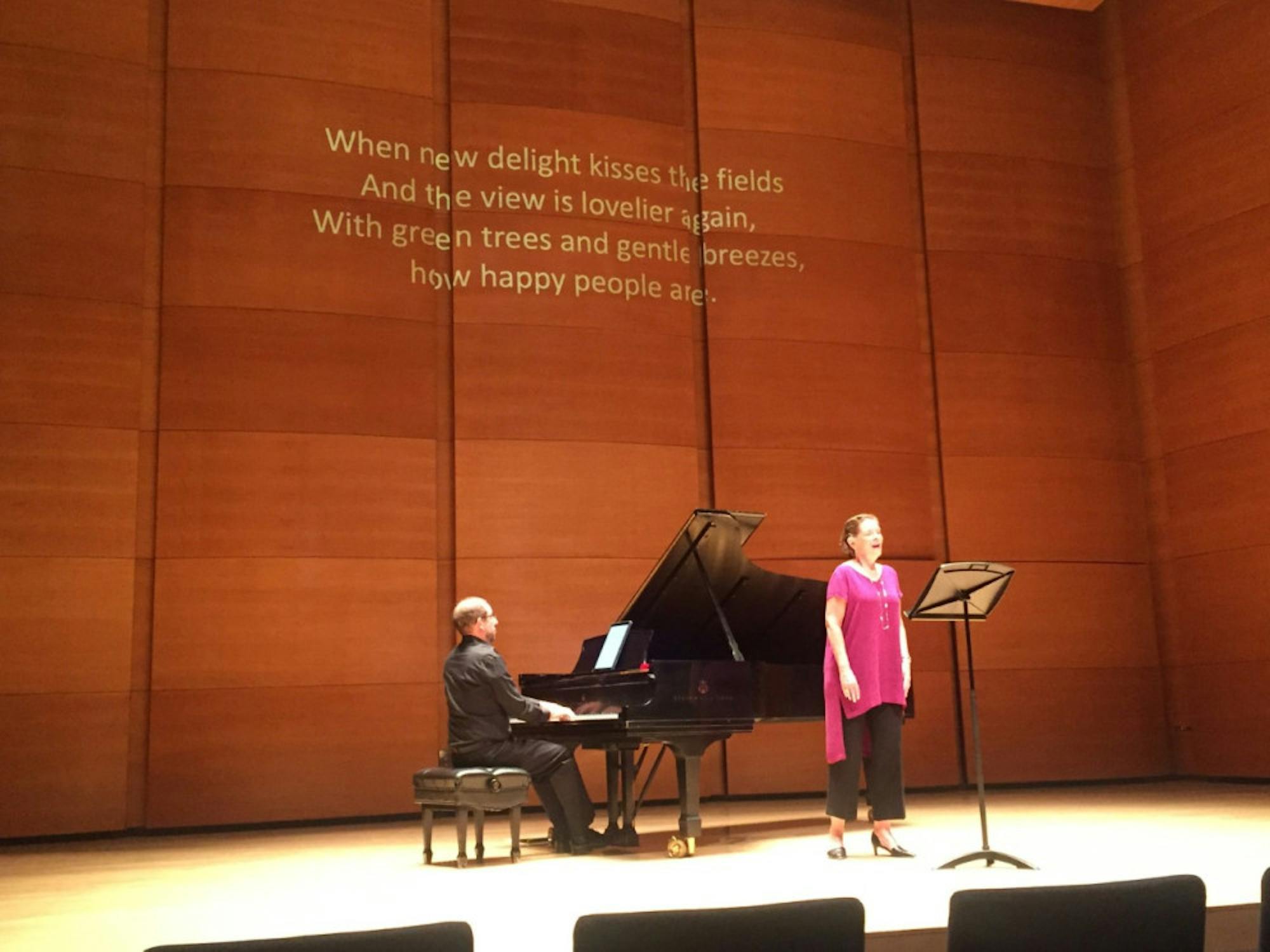This year’s Sunday Concert Series began on a high note with a performance by soprano Susan Narucki and pianist Donald Berman in a concert featuring modern and contemporary works. The concert, “Ill, Moody, and Tongue-Tied,” included emotional art pieces and vignettes by a variety of composers, both widely celebrated and on-the-rise.
The concert began in dissonance as Berman played the opening notes of "Au bord de la route" (1922) by Nadia Boulanger. When Narucki entered, she immediately filled Distler Performance Hall with her rich voice and warm vibrato. The duo gave a nuanced performance that brilliantly highlighted the expression in the lyrics and melodies.
"J’ai frappé" (1922), one of Boulanger’s most known works, was second on the program. The ability of both performers to convey emotions in complete simultaneity was demonstrated in the various key modulations of this moving work, which explored the desperation of knocking on a closed door.
The third piece was Boulanger’s "Cantique" (1909), which gave the audience its first glimpse at Narucki’s impressive vocal range. This song included themes of longing and love, which were demonstrated beautifully through dynamic tension rather than dissonance.
Boulanger’s "Chanson" (1909) concluded the four-song collection and was an emotional piece with the mood of each verse contrasting the last. The dexterity required to make such quick transitions was not a problem for Narucki and Berman; each verse was further proof of their ability to feel emotions in stereo and transmit those emotions to the audience.
Narucki stepped off the stage for the next piece, which was Boulanger’s solo piano work, "Vers la Vie Nouvelle," or, "Towards a New Life." Composed in 1918, this work evokes feelings of displacement and eventually, security. Berman captured these sentiments expertly by beginning the work with a heavy, full sound, and later falling into tenderness.
New moods were expressed in the next works, which were three of Ruth Crawford Seeger’s “Five Songs,” composed in 1929. These songs contained elements of both modern and pre-modern musical styles. The atonality of the work, as well as the profound emotion in the lyrics (by poet Carl Sandburg), adhered more to modern musical trends, whereas the recitative — operatic “sung speech” — patterns of the vocals were reminiscent of Baroque and Renaissance opera. Seeger’s "White Moon" stood out as an impeccable example of concurrent and contrasting moods; Berman’s piano was chilling and eerie, while Narucki’s vocals warmly enveloped the piano.
The last works before intermission were composed by Viktor Ullmann in 1943 and were moody both in lyrics and melody. This performance of Ullmann’s works was yet another testament to the ability of Berman and Narucki to feed off each other’s emotional and musical energy.
The second half of the concert began with works by four living composers: Ingrid Stölzel, Christopher Cerrone, Nina C. Young and Aaron Helgeson. These performances were engaging and affecting. During Young’s "Swan Song" (2018), the audience shared a laugh when Berman unexpectedly stood up from his bench to pluck a string inside the piano before promptly returning to his traditional pianist posture.
Five vignettes of the renowned American composerCharles Ives wrapped up the concert in perhaps the most emotional performance of the afternoon. The humorous "Ann Street" (1921) was cut short by an emotional and warm "At Sea" (1921), which in turn became a theatrical rendition of "The Greatest Man" (1921). "West London" (1921) followed and was an unsettling description of a homeless woman and her child, including lyrics that gave this concert its name — ill, moody and tongue-tied — to describe the urchins. The final work of the program was Ives’s nostalgic "Down East" (1919), which was the only work of the program to have a clear chord progression. The concert was well-received by the audience, who gave ample applause to the deserving duo.
Correction: A previous version of this article incorrectly referred to David Berman in the headline. His name is Donald Berman. The article has been updated to reflect this change. The Daily regrets this error.
Anything but 'Tongue-Tied': Susan Narucki, Donald Berman shine in Sunday Concert Series

Soprano Susan Narucki and pianist Donald Berman present a song recital featuring works by emerging composers Nina C. Young, Ingird Stolzel, Christopher Cerrone and Aaron Helgeson, with music of 20th century non-conformists Nadia Boulanger, Charles Ives, Viktor Ullmann and Ruth Crawford Seeger in the Distler Performance Hall on Sept. 15, 2019.





